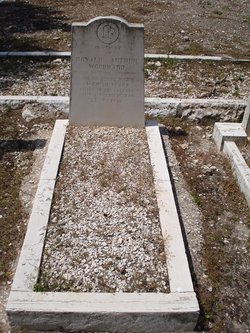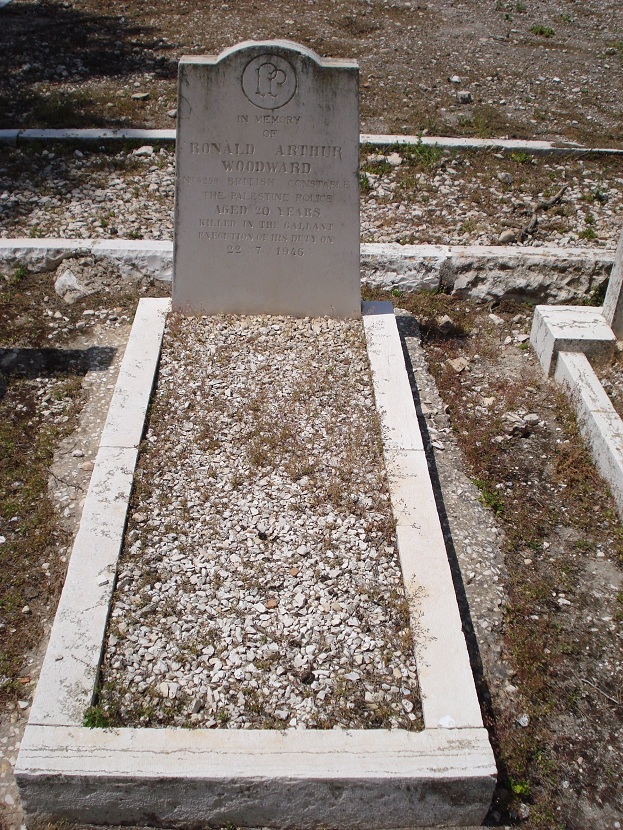Killed in the King David Hotel bomb outrage.
He was 20 and the son of Mr. and Mrs. Arthur William Woodward of Rotherfield, Sussex.
One of the great dramas in British imperial history, the strife-torn three decades of British rule in Palestine, known as the Mandate (1917-1948), remains controversial even now. The British Mandate in Palestine, which was granted after World War 1, and was due to expire in 1948. Peaceful progress towards self-government for the region was impossible and the British Army found itself in the middle of a power struggle between Arab and Jewish inhabitants and was being attacked by both sides.
On the morning of the 22nd of July 1946 a party of between 15 and 20 Jews, dressed as Arabs, pretending to be an Arab working party, entered the King David Hotel. The hotel housed the Secretariat of the Government of Palestine and Headquarters of the British Forces in Palestine and Transjordan. The terrorists, members of the Irgun (full title: Irgun Zevai Leumi), "The National Military Organization in the Land of Israel", a Zionist paramilitary group that operated in Mandate Palestine, were able to enter the building without arousing too much attention because part of the building was still being used as a hotel and other people frequented it.Having unloaded from their lorry several milk churns filled with 225 kilograms of explosive, they placed them in the basement of the wing of the hotel occupied by the Secretariat.
The Irgun committed the attack in response to Operation Agatha, known within Israel then and now as "Black Saturday".British troops had searched the Jewish Agency on June 29 and confiscated large quantities of documents about the group's operations and links with violent groups. The intelligence information was taken to the King David Hotel building in Jerusalem. The building contained the British military command and their Criminal Investigation Division. The "Hotel housed the nerve centre of British rule in Palestine". Specifically, the Irgun aimed at destroying the southern wing of the hotel, which housed the Mandate's intelligence records about Irgun, the Hagana, Lehi, and other Jewish paramilitary groups.
From the wreckage and rubble the rescuers managed to extract six survivors. The last to be found was D. C. Thompson, 24 hours after the building had collapsed. He appeared to be more or less unhurt, but later died due to shock.
91 people were killed, most of them being staff of the hotel or Secretariat: 21 were first-rank government officials; 49 were second-rank clerks, typists and messengers, junior members of the Secretariat, employees of the hotel and canteen workers; 13 were soldiers; 3 policemen; and 5 were members of the public. By nationality, there were 41 Arabs, 28 British citizens, 17 Palestinian Jews, 2 Armenians, 1 Russian, 1 Greek and 1 Egyptian. 46 people were injured. Some of the deaths and injuries occurred in the road outside the hotel and in adjacent buildings. No identifiable traces were found of thirteen of those killed.
A British officer standing nearby, Captain Alexander Mackintosh, became suspicious of this group of Arabs and began to ask questions, but was suddenly gunned down by a member of the Jewish gang and subsequently died. A policeman stationed at the tradesman's entrance suffered a similar fate when he challenged the Jewish terrorists. Both victims were unarmed.
Killed in the King David Hotel bomb outrage.
He was 20 and the son of Mr. and Mrs. Arthur William Woodward of Rotherfield, Sussex.
One of the great dramas in British imperial history, the strife-torn three decades of British rule in Palestine, known as the Mandate (1917-1948), remains controversial even now. The British Mandate in Palestine, which was granted after World War 1, and was due to expire in 1948. Peaceful progress towards self-government for the region was impossible and the British Army found itself in the middle of a power struggle between Arab and Jewish inhabitants and was being attacked by both sides.
On the morning of the 22nd of July 1946 a party of between 15 and 20 Jews, dressed as Arabs, pretending to be an Arab working party, entered the King David Hotel. The hotel housed the Secretariat of the Government of Palestine and Headquarters of the British Forces in Palestine and Transjordan. The terrorists, members of the Irgun (full title: Irgun Zevai Leumi), "The National Military Organization in the Land of Israel", a Zionist paramilitary group that operated in Mandate Palestine, were able to enter the building without arousing too much attention because part of the building was still being used as a hotel and other people frequented it.Having unloaded from their lorry several milk churns filled with 225 kilograms of explosive, they placed them in the basement of the wing of the hotel occupied by the Secretariat.
The Irgun committed the attack in response to Operation Agatha, known within Israel then and now as "Black Saturday".British troops had searched the Jewish Agency on June 29 and confiscated large quantities of documents about the group's operations and links with violent groups. The intelligence information was taken to the King David Hotel building in Jerusalem. The building contained the British military command and their Criminal Investigation Division. The "Hotel housed the nerve centre of British rule in Palestine". Specifically, the Irgun aimed at destroying the southern wing of the hotel, which housed the Mandate's intelligence records about Irgun, the Hagana, Lehi, and other Jewish paramilitary groups.
From the wreckage and rubble the rescuers managed to extract six survivors. The last to be found was D. C. Thompson, 24 hours after the building had collapsed. He appeared to be more or less unhurt, but later died due to shock.
91 people were killed, most of them being staff of the hotel or Secretariat: 21 were first-rank government officials; 49 were second-rank clerks, typists and messengers, junior members of the Secretariat, employees of the hotel and canteen workers; 13 were soldiers; 3 policemen; and 5 were members of the public. By nationality, there were 41 Arabs, 28 British citizens, 17 Palestinian Jews, 2 Armenians, 1 Russian, 1 Greek and 1 Egyptian. 46 people were injured. Some of the deaths and injuries occurred in the road outside the hotel and in adjacent buildings. No identifiable traces were found of thirteen of those killed.
A British officer standing nearby, Captain Alexander Mackintosh, became suspicious of this group of Arabs and began to ask questions, but was suddenly gunned down by a member of the Jewish gang and subsequently died. A policeman stationed at the tradesman's entrance suffered a similar fate when he challenged the Jewish terrorists. Both victims were unarmed.
Sponsored by Ancestry
Advertisement
Records on Ancestry
Sponsored by Ancestry
Advertisement



